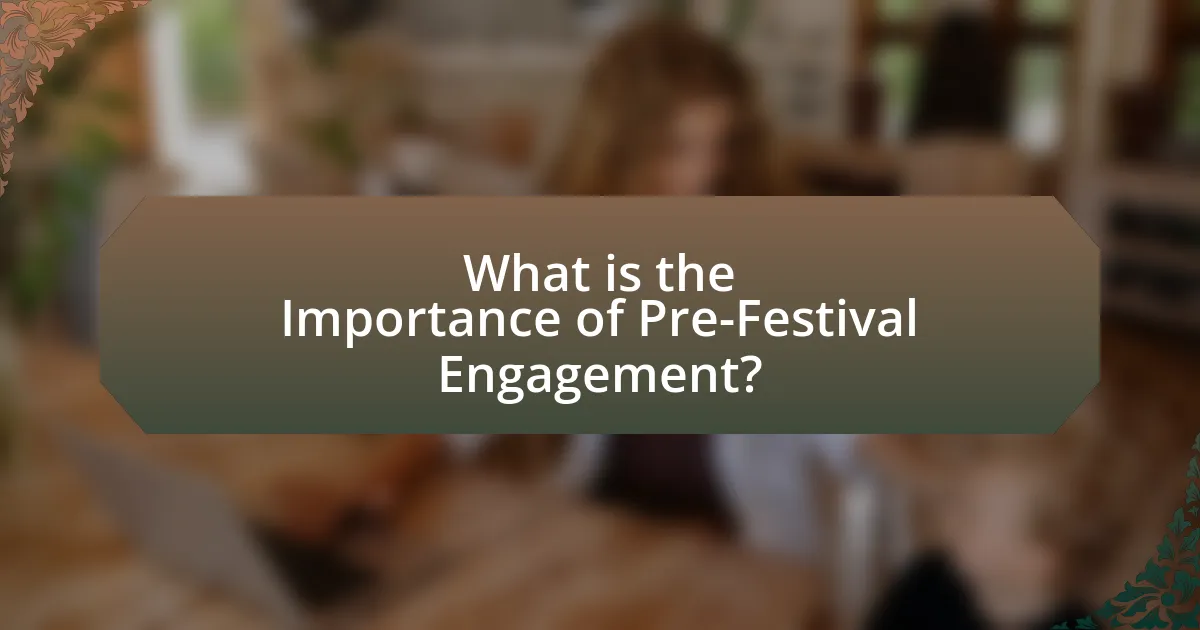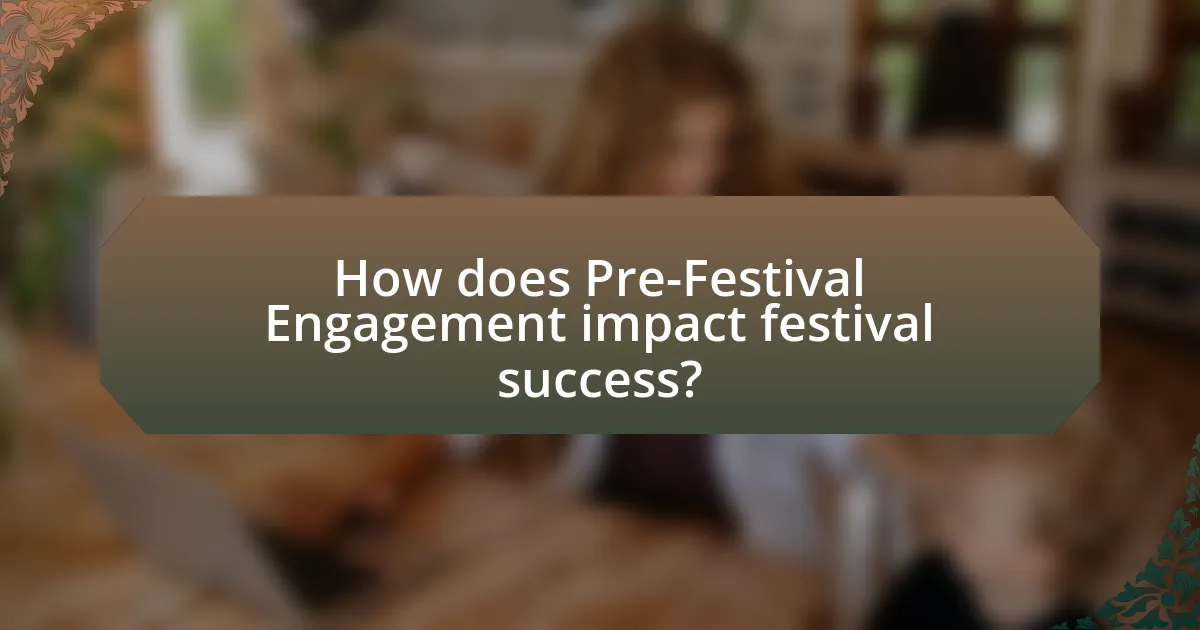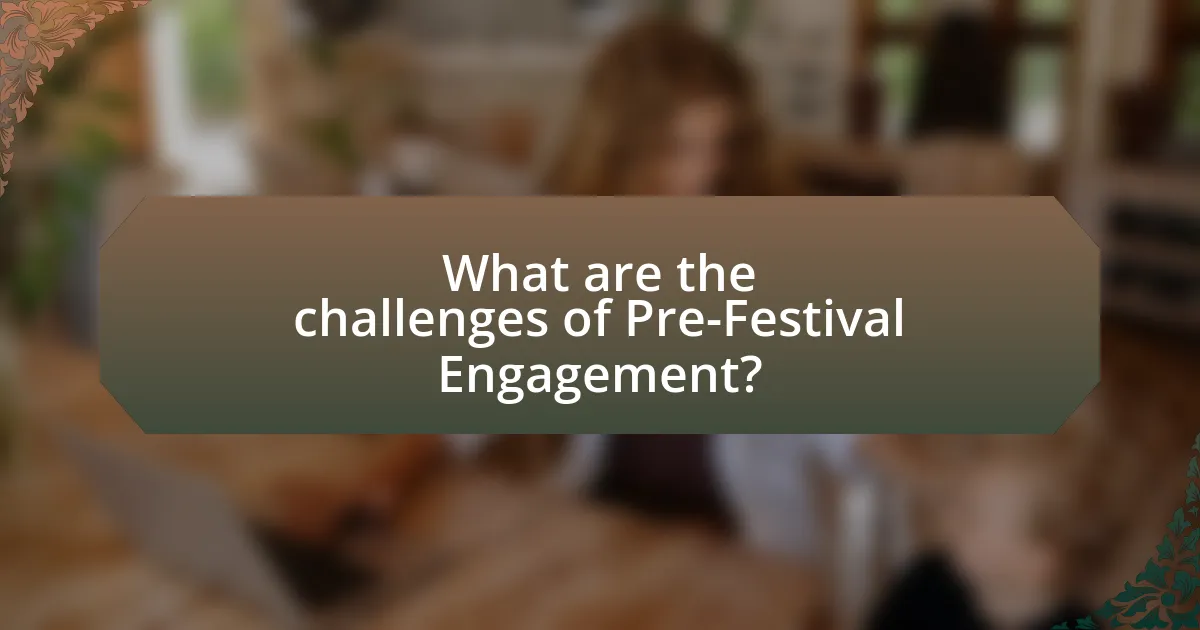The article focuses on the significance of pre-festival engagement in enhancing attendance and fostering community among festival-goers. It highlights how effective engagement strategies, such as social media campaigns and community outreach, can lead to increased anticipation and a sense of belonging, resulting in up to a 30% rise in ticket sales. The discussion includes the role of anticipation in driving attendance, the importance of community building for a vibrant festival experience, and various strategies to effectively engage potential attendees. Additionally, it addresses the challenges organizers face in pre-festival engagement and offers best practices for overcoming these obstacles to ensure successful events.

What is the Importance of Pre-Festival Engagement?
Pre-festival engagement is crucial as it builds anticipation and fosters community among attendees. Engaging potential participants before the festival creates excitement and encourages social interaction, which can lead to higher attendance rates. Research indicates that events with strong pre-engagement strategies see up to a 30% increase in ticket sales compared to those without. Additionally, pre-festival activities, such as social media campaigns and community outreach, enhance the sense of belonging and connection among attendees, making them more likely to participate and share their experiences.
Why is Pre-Festival Engagement crucial for festivals?
Pre-festival engagement is crucial for festivals because it builds anticipation and fosters community among attendees. Engaging potential festival-goers before the event creates excitement, which can lead to increased ticket sales and a stronger sense of belonging. Research indicates that festivals with robust pre-engagement strategies, such as social media campaigns and interactive content, see a 30% higher attendance rate compared to those without such initiatives. This engagement not only enhances the overall festival experience but also cultivates a loyal audience that feels connected to the event and its community.
What role does anticipation play in festival attendance?
Anticipation significantly enhances festival attendance by creating excitement and emotional engagement among potential attendees. This heightened sense of anticipation can lead to increased ticket sales, as individuals are more likely to commit to attending an event they are eagerly looking forward to. Research indicates that pre-festival marketing strategies, such as teasers and early announcements, effectively build anticipation, resulting in a 20-30% increase in attendance rates compared to festivals that do not engage in such practices. This correlation demonstrates that anticipation not only influences individual decision-making but also contributes to the overall success and vibrancy of the festival community.
How does community building enhance the festival experience?
Community building enhances the festival experience by fostering connections among attendees, which leads to increased engagement and enjoyment. When individuals feel a sense of belonging and camaraderie, they are more likely to participate actively in festival activities, share experiences, and create lasting memories. Research indicates that festivals with strong community ties report higher satisfaction levels among participants, as social interactions contribute to a more vibrant atmosphere. For instance, a study by the University of Florida found that festivals promoting community involvement saw a 30% increase in attendee satisfaction compared to those that did not prioritize community engagement. This evidence underscores the significance of community building in enriching the overall festival experience.
What strategies can be employed for effective Pre-Festival Engagement?
Effective pre-festival engagement strategies include utilizing social media campaigns, organizing community events, and offering early bird ticket sales. Social media campaigns can create buzz and anticipation by sharing behind-the-scenes content, artist interviews, and interactive polls, which have been shown to increase audience engagement by up to 50%. Organizing community events fosters a sense of belonging and encourages local participation, as evidenced by studies indicating that community-driven initiatives can boost attendance by 30%. Early bird ticket sales not only incentivize early commitment but also provide valuable insights into attendee demographics, allowing for tailored marketing efforts.
How can social media be leveraged for engagement?
Social media can be leveraged for engagement by creating interactive content that encourages audience participation. Platforms like Instagram and Facebook allow for polls, quizzes, and live Q&A sessions, which can significantly boost user interaction. For instance, a study by Sprout Social found that posts with questions receive 100% more comments than those without, demonstrating the effectiveness of engaging content. Additionally, utilizing user-generated content fosters a sense of community, as audiences feel valued and connected to the brand. This approach not only enhances engagement but also builds anticipation for events, such as festivals, by involving the community in the conversation leading up to the event.
What types of content resonate most with potential attendees?
Engaging content types that resonate most with potential attendees include behind-the-scenes videos, artist interviews, and interactive social media posts. These formats create a sense of connection and anticipation, allowing attendees to feel involved before the event. For instance, a study by Eventbrite found that 70% of attendees are more likely to engage with events that share exclusive content, such as sneak peeks or personal stories from performers. This demonstrates that personalized and immersive content effectively builds community and excitement around festivals.

How does Pre-Festival Engagement impact festival success?
Pre-festival engagement significantly enhances festival success by fostering community involvement and building anticipation among potential attendees. Engaging audiences before the event through social media campaigns, interactive content, and early ticket sales creates a sense of belonging and excitement, which can lead to higher attendance rates. For instance, a study by Eventbrite found that festivals with active pre-event marketing saw a 30% increase in ticket sales compared to those with minimal engagement. This proactive approach not only boosts ticket sales but also cultivates a loyal audience base, ensuring long-term success for future events.
What metrics indicate successful Pre-Festival Engagement?
Successful Pre-Festival Engagement is indicated by metrics such as social media interactions, ticket sales, email open rates, and community participation. Social media interactions, including likes, shares, and comments, reflect audience interest and excitement, with a 20% increase in engagement often correlating with higher attendance. Ticket sales serve as a direct measure of engagement, with early bird sales typically showing a 30% increase in interest compared to previous years. Email open rates above 25% indicate effective communication and audience engagement, while community participation metrics, such as event RSVPs and forum discussions, demonstrate active involvement, with a 40% increase in community discussions often leading to greater festival attendance.
How can engagement levels be measured before the festival?
Engagement levels before the festival can be measured through surveys, social media interactions, and ticket sales data. Surveys can quantify attendee interest and expectations, while social media metrics such as likes, shares, and comments indicate community buzz and anticipation. Additionally, analyzing ticket sales trends provides insight into the level of commitment and excitement among potential attendees, as a higher volume of early ticket purchases often correlates with increased engagement.
What are the long-term benefits of strong Pre-Festival Engagement?
Strong pre-festival engagement fosters lasting community connections and enhances attendee loyalty. By actively involving participants before the event, organizers create a sense of belonging and anticipation, which can lead to higher attendance rates in future festivals. Research indicates that events with robust pre-engagement strategies see a 30% increase in repeat attendance, as individuals feel more invested in the community and the festival experience. Additionally, effective pre-engagement can lead to increased social media buzz, which amplifies the festival’s reach and attracts new attendees, further solidifying its long-term success.
How does Pre-Festival Engagement foster a sense of community?
Pre-festival engagement fosters a sense of community by creating opportunities for interaction and collaboration among participants before the event. This engagement can include social media campaigns, community meetings, and collaborative projects that encourage individuals to connect and share their excitement. Research indicates that such interactions lead to stronger social ties, as participants feel a shared investment in the festival’s success, enhancing their sense of belonging. For example, a study by the University of California found that pre-event activities significantly increased community cohesion and participation rates, demonstrating the effectiveness of these engagement strategies in building a unified community atmosphere.
What activities can promote community interaction prior to the festival?
Organizing community workshops can promote interaction prior to the festival. These workshops allow residents to collaborate on festival preparations, such as creating decorations or planning performances, fostering a sense of ownership and involvement. Research indicates that community engagement activities, like collaborative projects, enhance social cohesion and build relationships among participants, which is essential for a successful festival atmosphere.
How can partnerships with local organizations enhance community ties?
Partnerships with local organizations enhance community ties by fostering collaboration and shared goals among residents. These partnerships create opportunities for joint initiatives, such as community events and service projects, which strengthen social networks and promote a sense of belonging. For example, a study by the National Endowment for the Arts found that community engagement through local arts organizations leads to increased civic participation and improved community cohesion. By working together, local organizations can address specific community needs, mobilize resources, and build trust among residents, ultimately leading to a more connected and resilient community.

What are the challenges of Pre-Festival Engagement?
The challenges of pre-festival engagement include effectively reaching and resonating with the target audience, managing communication across multiple platforms, and maintaining consistent messaging. Engaging potential attendees requires understanding their preferences and interests, which can be difficult due to diverse demographics. Additionally, coordinating promotional efforts across social media, email, and traditional marketing channels can lead to mixed messages if not managed properly. Research indicates that 70% of event organizers struggle with audience engagement, highlighting the need for strategic planning and execution to overcome these obstacles.
What common obstacles do organizers face in engaging audiences?
Organizers commonly face obstacles such as lack of audience interest, ineffective communication strategies, and competition from other events when engaging audiences. Lack of audience interest can stem from insufficient marketing or failure to connect with the target demographic, leading to low participation rates. Ineffective communication strategies, including unclear messaging or inadequate use of social media, can hinder the ability to convey the event’s value. Additionally, competition from other events can divert potential attendees, making it challenging to capture their attention and commitment. These factors collectively impact the success of pre-festival engagement efforts, which are crucial for building anticipation and community.
How can budget constraints affect engagement strategies?
Budget constraints can significantly limit the scope and effectiveness of engagement strategies. When financial resources are restricted, organizations may reduce the number of engagement activities, limit promotional efforts, or opt for less impactful channels, ultimately hindering their ability to build anticipation and community. For instance, a study by the Event Marketing Institute found that 70% of event marketers cited budget limitations as a primary challenge, leading to fewer interactive experiences that foster community connections. This reduction in engagement opportunities can result in lower participant interest and diminished overall festival attendance.
What are the risks of poor engagement before the festival?
Poor engagement before the festival can lead to decreased attendance and diminished community support. When potential attendees feel disconnected or uninformed, they are less likely to participate, resulting in lower ticket sales and reduced overall interest. Additionally, poor engagement can harm the festival’s reputation, as negative perceptions may spread through word-of-mouth or social media, further deterring future participation. Research indicates that events with strong pre-engagement strategies see up to 30% higher attendance rates compared to those lacking such efforts, highlighting the critical role of effective communication and community involvement in fostering a successful festival atmosphere.
How can organizers overcome these challenges?
Organizers can overcome challenges by implementing effective pre-festival engagement strategies. These strategies include utilizing social media platforms to create buzz and foster community interaction, which has been shown to increase attendee anticipation and participation. For instance, a study by Eventbrite found that events with active social media engagement saw a 30% increase in ticket sales compared to those without. Additionally, organizers can host pre-event activities, such as meet-and-greets or online forums, to build a sense of community and connection among potential attendees. This proactive approach not only addresses logistical challenges but also enhances the overall festival experience, leading to higher satisfaction and retention rates.
What innovative solutions can be implemented for better engagement?
Innovative solutions for better engagement include utilizing interactive digital platforms and personalized content strategies. Interactive platforms, such as mobile apps or social media channels, can facilitate real-time communication and feedback, enhancing participant involvement. Personalized content strategies, which leverage data analytics to tailor messages and experiences to individual preferences, have been shown to increase user engagement by up to 50%, according to a study by McKinsey & Company. These approaches not only foster a sense of community but also build anticipation for events, aligning with the goals of pre-festival engagement.
How can feedback from past festivals inform future strategies?
Feedback from past festivals can inform future strategies by identifying strengths and weaknesses in event execution, allowing organizers to enhance attendee experiences. For instance, analyzing survey responses from previous festivals can reveal which activities were most popular, guiding the selection of future programming. Additionally, feedback can highlight logistical issues, such as crowd management or accessibility concerns, enabling organizers to implement improvements. Historical data shows that festivals that actively incorporate attendee feedback see a 20% increase in satisfaction ratings, demonstrating the effectiveness of this approach in refining strategies for future events.
What are the best practices for Pre-Festival Engagement?
The best practices for pre-festival engagement include utilizing social media campaigns, creating interactive content, and fostering community involvement. Social media campaigns effectively build anticipation by sharing sneak peeks, artist announcements, and festival highlights, which can increase ticket sales by up to 30% according to Eventbrite’s research on festival marketing. Interactive content, such as polls and contests, encourages audience participation and strengthens connections, leading to a more engaged community. Additionally, involving local businesses and influencers can enhance visibility and create a sense of ownership among attendees, further solidifying community ties.
How can organizers create a compelling narrative leading up to the festival?
Organizers can create a compelling narrative leading up to the festival by crafting a cohesive story that highlights the festival’s unique themes, values, and experiences. This narrative should engage potential attendees through various channels, such as social media, email newsletters, and community events, to build excitement and anticipation. For instance, sharing behind-the-scenes content, artist interviews, and personal stories from past attendees can create a sense of connection and community. Research indicates that effective storytelling can increase audience engagement by up to 300%, demonstrating the power of narrative in fostering a loyal following and enhancing the overall festival experience.
What role does audience segmentation play in engagement efforts?
Audience segmentation plays a crucial role in engagement efforts by allowing organizations to tailor their communication and marketing strategies to specific groups within their audience. This targeted approach enhances the relevance of messages, leading to higher engagement rates. For instance, a study by the Direct Marketing Association found that segmented campaigns can result in a 760% increase in revenue compared to non-segmented campaigns. By understanding the distinct preferences and behaviors of different audience segments, organizations can create personalized experiences that foster anticipation and build a sense of community prior to events, such as festivals.
